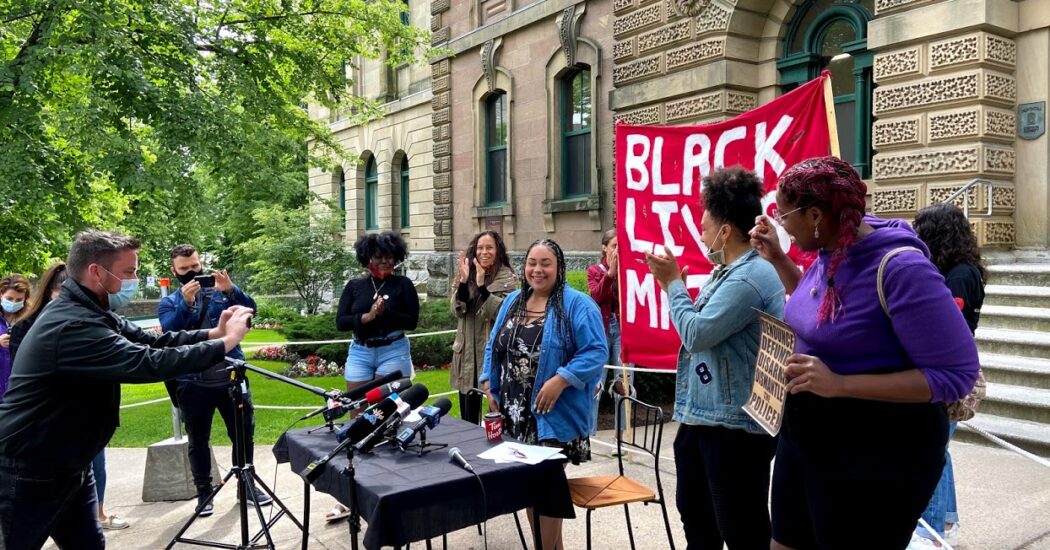
KJIPUKTUK (Halifax) – Can you hear us, can you see us, are we invisible?
It’s 2020 and we are still combating systemic anti-Black racism in our society. As we fight back against the systemic and deliberate willful actions of police officers, their antics only seem to heighten.
This happens just when we thought that our message was getting through, just when people began to understand that Black Lives Matter is not just a fashionable trend or hashtag, but rather it is a cry for justice from the Black community.
When Black people or People of Color enter restaurants, grocery stores, apparel stores, etc., they are not treated the same as a white person. Instead, they are often followed, harassed, and victimized by store clerks, security officers and police officers. Where does the line get drawn? When will enough be enough?
While most of the conversations, protests, rallies and media attention have died down, for the Black Community this is a nightmare that seemingly never ends. While Covid-19 responses are rapid and purposeful, the epidemic of systemic racism continues unabated.
In the last year there have been two incidents that have brought attention to Walmarts in our province. Santina Rao and Melissa Brushett were both arrested at Walmarts and without substantial proof that either one of them had committed a criminal offence.
Santina Rao: Slammed to the ground

In January of 2020 Santina Rao was shopping with her two children in the Walmart located on Mumford Road in Halifax. Santina had paid for electronics in the electronics department, and continued shopping. Next she stopped in the toys department on her way to the front to pay for some produce that was unable to be weighed at the checkout where she made her first purchase. Santina placed her produce underneath her stroller, fully intending to pay for them. While in the toys’ aisle, Santina was approached by several police officers who assumed that Santina was concealing items, with the intent to steal.
While police officers circled Santina, she attempted to show her receipts and suggested that the officers search her stroller. The officers attempted to cuff Santina without explanation, and she became frustrated. As the situation escalated and became physical, Santina was slammed to the ground and arrested, all this in full view of her small children.
As a result of this arrest, Santina sustained injuries to her hand and face. She was charged with resisting arrest and disturbing the peace.
These charges were dropped in July of 2020, but that does not excuse or address the altercation and infringement on Santina’s rights as a consumer and law-abiding citizen.
History repeats itself in the case of Melissa Brushett
Now, eleven months after Santina’s incident in Walmart, another incident has been brought to the public’s attention. Melissa Brushett and her son Deion were shopping at the Dartmouth Crossing Walmart. Melissa and Deion were purchasing toys for Deion’s daughter and Melissa nieces and nephews. After purchasing the toys, Melissa and Deion decided to go back to pick up a few more toys. Melissa kept her receipt visible as she did not want to be accused of shoplifting.
An incident with another shopper occurred while Melissa and Deion were attempting to pick up the other toys. As this incident was frustrating for Melissa, she decided to just leave. Melissa held her receipt up while exiting the store and offered the attendant to check her items. The attendant allowed Melissa and Deion to proceed out the door.
As Melissa and Deion left the store, the security guards followed her close behind. When they reached their car, the police pulled up right behind them, blocking the car from moving. Before Melissa had the chance to even explain or show her receipt, the police officer said he didn’t want to hear it and accused her of shoplifting. Melissa was slammed against the car and arrested. Deion was also arrested and placed in the back of the police car, for putting his hand on the police officer’s shoulder to protect Melissa.
After the police checked Melissa’s receipt, they allowed her and her son to leave. No criminal charges were laid. But the entire incident should never have happened!
Where do we go from here?
While we continue to hear of cases of racial profiling (systemic racism) more and more, we must decide upon a legal response. Often we look to Criminal Law or the Human Rights Commission to address these situations.
Unfortunately, under the Canadian criminal justice system it is very difficult for the Crown to prove that crimes are racial motivated. The same is true for the Human Rights Commission. All too often complaints on the grounds of race are dismissed by case workers or investigators, claiming that race is not a factor. However, in the majority of these cases that claim is incorrect.
See also: Black human rights matter: Rally calls for shake-up of the Nova Scotia Human Rights Commission
So, if not the criminal justice system or the Human Rights Commission, where can people like Santina and Melissa turn to?
As a first-year law student I recommend researching other areas of law to seek justice.
Tort law, civil law that deals with compensation for injuries, could be a fruitful area of law to pursue in cases like Santina’s and Melissa’s. After all, the discrimination based on race (racial profiling) has resulted in physical or psychological injuries, and even defamation of character. An individual could even pursue a claim on the basis of assault, battery, false arrest and false imprisonment.
This would require claimants to seek legal counsel, which can be costly, but most firms agree on a contingency fee-based agreement, where the lawyer only gets paid if you get paid. This may make it a financially feasible way of seeking justice.
I know the idea of the litigation sounds tedious and time consuming, but in the end, this could result in justice.
Of course, although this tactic may result in financial compensation, it will not directly address systemic roots or change the way the Human Rights Commission acts.
I believe it is the duty of legal practitioners to help victims of racism seek justice. But this can’t just come from the Black community. There needs to be a collective obligation of all citizens, law enforcers, the legislature and all levels of government.
As Henderson Paris, one of New Glasgow’s most noted Black activists, once said, “Challenges regarding race will undoubtedly happen. However, we as a combined and resilient society of all cultures and nationalities must face it head on.”
See also: Wayne Desmond: My long search for safe spaces for Black learners
With a special thanks to our generous donors who make publication of the Nova Scotia Advocate possible.
Subscribe to the Nova Scotia Advocate weekly digest and never miss an article again. It’s free!




when I worked retail I was told that it was illegal to stop a shoplifter unless the theft was actually witnessed and the accused had left the store. It seems to me that the employees who reported these people to police should be charged with making false accusations.